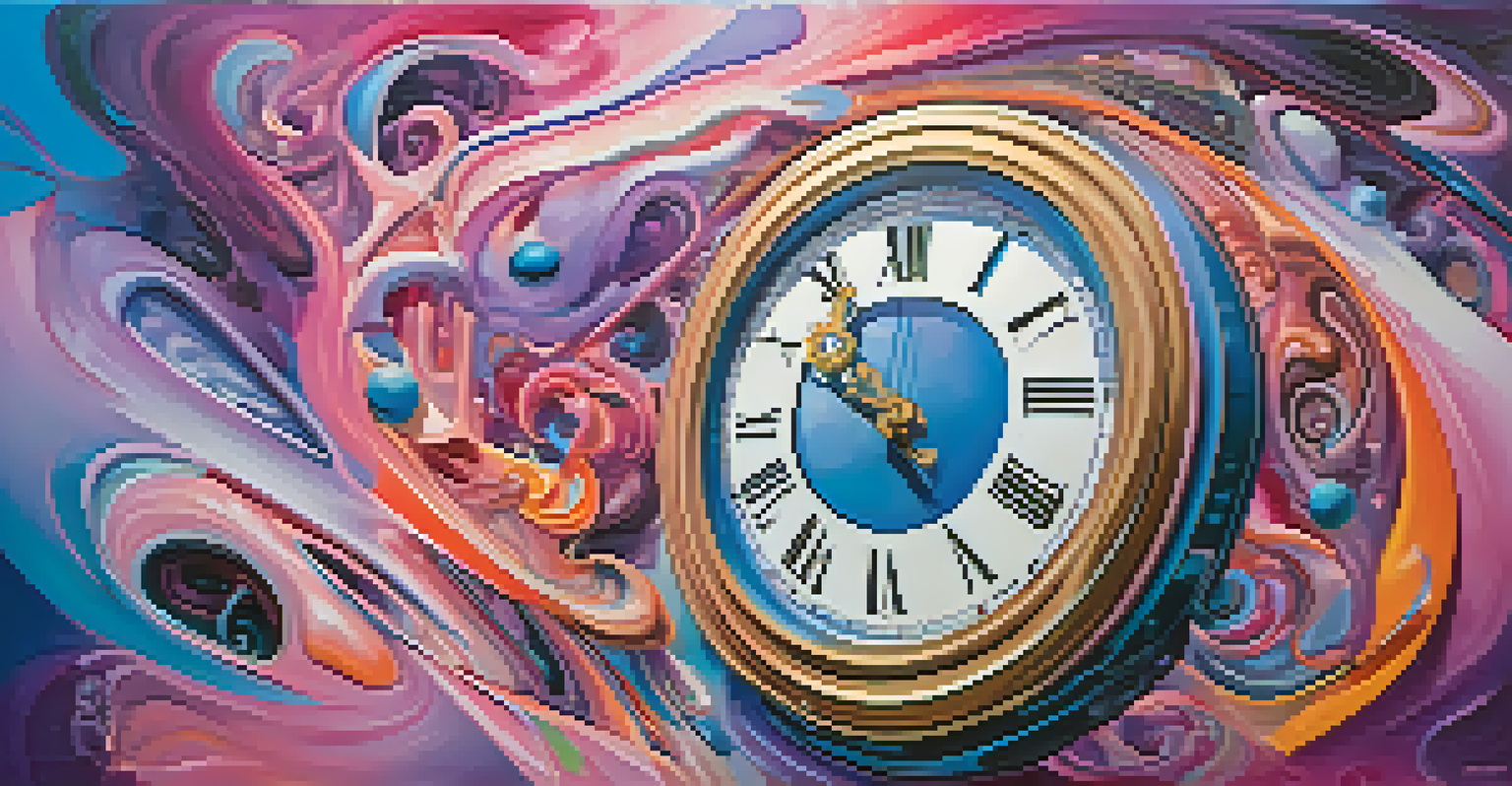The Psychological Impact of Entheogens on Temporal Experience

Understanding Entheogens: A Brief Overview
Entheogens are substances that can induce altered states of consciousness, often used in spiritual or therapeutic contexts. Common examples include psilocybin mushrooms and ayahuasca, which have been utilized for centuries in various cultures. These compounds can significantly affect perception, including how we experience time.
The mind is everything. What you think you become.
The term 'entheogen' comes from the Greek words meaning 'generating the divine within,' reflecting their historical use in religious rituals. Unlike recreational drugs, entheogens are often taken with the intent to explore deeper aspects of the self, leading to profound psychological effects. Understanding their impact on temporal experience can shed light on our consciousness.
As we explore this topic, we’ll see how these substances can warp our sense of time, making moments feel elongated or compressed. This distortion can lead to unique insights about life and existence, providing a fascinating glimpse into the mind's workings.
How Entheogens Affect Perception of Time
One of the most intriguing effects of entheogens is the alteration of temporal perception. Many users report that time feels like it has slowed down or sped up during their experiences. For instance, a single hour might feel like an eternity, allowing individuals to explore thoughts and emotions in depth.

This distortion can be likened to how a child perceives time—days can seem endless during summer break, while adults often feel like the months fly by. Such shifts in perception might allow users to reflect on their lives and experiences in ways that feel more profound than in ordinary consciousness.
Entheogens Alter Time Perception
Entheogens can significantly distort our sense of time, leading users to experience moments as either elongated or compressed.
Researchers suggest that this altered state can be linked to changes in brain activity, particularly in areas responsible for processing time. When under the influence of entheogens, the brain may operate differently, creating a fascinating interplay between consciousness and temporal experience.
The Role of Context in Temporal Experience
Context plays a crucial role in how entheogens affect our sense of time. The environment in which these substances are consumed can greatly influence the experience. For example, a calm and serene setting may enhance feelings of timelessness, while a chaotic environment could lead to anxiety and a fragmented sense of time.
The experience of time can be profoundly altered by the use of psychedelics, providing new insights into the nature of reality and consciousness.
Consider a person taking psilocybin in a peaceful forest versus a loud, crowded party. The peaceful surroundings might allow for a deep, reflective experience, while the chaos could distort their perception, making time feel disjointed. This highlights the importance of setting, often referred to as 'set and setting' in the psychedelic community.
In essence, the psychological impact of entheogens on time is not solely about the drug itself; it’s a complex interplay between the individual’s mental state and their surroundings. Understanding this dynamic can enhance our appreciation of the profound experiences entheogens can offer.
Psychological Benefits of Altered Temporal Perception
The unique experience of altered temporal perception can lead to various psychological benefits. Many users report feelings of connectedness, peace, and a deeper understanding of their lives. This can foster a greater appreciation for the present moment, which is often overlooked in our fast-paced world.
Moreover, by experiencing time differently, individuals may confront past traumas or unresolved issues in a new light. The expanded temporal experience can allow for reflection and healing, as they view their life events from a different perspective.
Setting Affects Experience Quality
The environment in which entheogens are consumed, known as 'set and setting,' plays a crucial role in shaping the user's temporal experience.
This therapeutic potential is being explored in clinical settings, where entheogens are being studied for their ability to aid in mental health treatments. The insights gained from these experiences may not only improve well-being but also enhance one’s relationship with time itself.
Cultural Perspectives on Time and Entheogens
Throughout history, various cultures have utilized entheogens in rituals that revolve around the perception of time. For example, many Indigenous communities view time as cyclical rather than linear, a perspective often embraced during entheogenic rituals. This cyclical view allows for a sense of connection to the past, present, and future.
In these contexts, time may not be measured in hours or days but through spiritual experiences and personal growth. The use of entheogens can facilitate a deeper understanding of one’s place within this cycle, fostering a sense of belonging and continuity.
By examining these cultural practices, we can gain insight into how different societies interpret time and the role entheogens play in shaping these perceptions. It emphasizes how our understanding of time is not universal but rather influenced by cultural narratives.
The Science Behind Temporal Distortion
Recent studies have begun to unravel the science behind how entheogens alter temporal perception. Neuroimaging research shows that these substances can affect brain networks involved in time processing, particularly the default mode network (DMN). The DMN is active during self-referential thought and daydreaming, which may explain the time distortion experienced during trips.
When under the influence of entheogens, the DMN may become hyperactive, leading to an altered sense of self and time. This could allow individuals to explore memories and thoughts more freely, contributing to the feeling that time has expanded.
Potential for Psychological Healing
Altered temporal perception from entheogen use can foster deeper self-reflection and emotional healing, offering therapeutic benefits.
Understanding the neuroscience behind these effects not only enriches our knowledge of entheogens but also opens avenues for future research in psychology and consciousness studies. It bridges the gap between subjective experiences and scientific inquiry.
Navigating the Risks and Benefits of Entheogen Use
While entheogens offer fascinating insights into temporal experience, they also come with risks. Not everyone will have a positive experience, and for some, the altered perception of time can lead to confusion or anxiety. It's essential for users to prepare mentally and physically, ensuring a supportive setting.
On the flip side, when used responsibly, entheogens can provide transformative experiences. Many users find that they emerge from their journeys with a renewed perspective on time and life itself. The key is to approach these substances with respect and caution, acknowledging both their potential benefits and risks.

Ultimately, the journey with entheogens is deeply personal, and each individual's experience will vary. By understanding both sides of the coin, users can make more informed decisions about their exploration of these powerful substances.